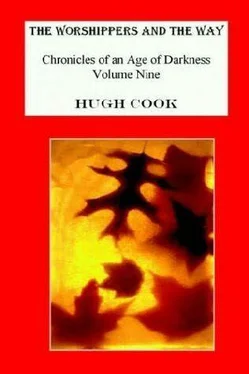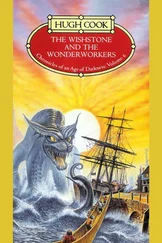Hugh Cook - The Worshippers and the Way
Здесь есть возможность читать онлайн «Hugh Cook - The Worshippers and the Way» весь текст электронной книги совершенно бесплатно (целиком полную версию без сокращений). В некоторых случаях можно слушать аудио, скачать через торрент в формате fb2 и присутствует краткое содержание. Жанр: Фэнтези, на английском языке. Описание произведения, (предисловие) а так же отзывы посетителей доступны на портале библиотеки ЛибКат.
- Название:The Worshippers and the Way
- Автор:
- Жанр:
- Год:неизвестен
- ISBN:нет данных
- Рейтинг книги:4 / 5. Голосов: 1
-
Избранное:Добавить в избранное
- Отзывы:
-
Ваша оценка:
- 80
- 1
- 2
- 3
- 4
- 5
The Worshippers and the Way: краткое содержание, описание и аннотация
Предлагаем к чтению аннотацию, описание, краткое содержание или предисловие (зависит от того, что написал сам автор книги «The Worshippers and the Way»). Если вы не нашли необходимую информацию о книге — напишите в комментариях, мы постараемся отыскать её.
The Worshippers and the Way — читать онлайн бесплатно полную книгу (весь текст) целиком
Ниже представлен текст книги, разбитый по страницам. Система сохранения места последней прочитанной страницы, позволяет с удобством читать онлайн бесплатно книгу «The Worshippers and the Way», без необходимости каждый раз заново искать на чём Вы остановились. Поставьте закладку, и сможете в любой момент перейти на страницу, на которой закончили чтение.
Интервал:
Закладка:
"How is your daughter?" said the Lady Murasaki.
"Onica is well," said Hatch, dreading the question which would probably follow.
It did.
"How is your wife?"
"Talanta… Talanta is the same as ever."
So said Hatch. His lover corrected him. Not Talanta. No. Not that. Rather: the Lady Talanta.
"The Lady Talanta, then," said Hatch.
But she was no Lady, for Frangoni females did not bedeck themselves with gaudy titles. And Talanta was truly of the Frangoni. She was the Frangoni his parents had chosen for him, the woman he had brought to bed and who had given him children. And now she was – but he did not like to think about now. The now of his wife. Still less did he care to think of the future. Rather, he preferred for the moment – it might be wrong, doubtless was wrong, but this was the reality – to put his wife out of his mind.
His moment was all for the Lady Murasaki.
The Lady Murasaki, however, was not concerned with the moment but with Hatch's family.
"When did you last see the moneylender Polk?" said she.
"I saw him today," said Hatch.
"Did you then discuss your sister's debts?"
"We were, ah, interrupted," said Hatch.
"I trust you have a scheme to redeem your sister's debts," said the Lady Murasaki. "The news I hear of her is most distressing. It seems that she is in danger of being sold into slavery. Surely it is your duty to prevent that from happening."
"I have no money," said Hatch flatly.
"But," said Murasaki, good humor in her words, "you are a captain of the Imperial Guard and a favorite of the very emperor himself. How can you be without money?"
"How many times does it have to be told to be true?" said Hatch, starting to get irritated. "I have no money."
"Then," said Iro Murasaki, "you will get it."
"Very well then," said Hatch, suddenly angry. "Then I will go. Go seek my silvermine."
"You are tired," said the Lady Iro Murasaki, making allowances for him.
But Asodo Hatch did not respond, nor did he linger for the time it would have taken to kiss her. Instead, he quit the fine and mighty house of Pan Lay in something uncommonly like a fit of bad temper.
When Hatch was gone, the Lady Iro Murasaki reviewed their conversation, and the potential demand on her own treasury which was implicit in Hatch's situation. Had she truly heard something of a beggar's whine in his voice? She hoped she had imagined it.
She knew of a certainty that she could be of no assistance to him, for the money she had invested with the Bralsh yielded her but three per centum per annum. She had budgeted out her own expenses to the last minimum, and durst not risk her capital, since that was a certain way to ruin.
As an individual, no doubt Asodo Hatch would have been a good risk; but as a Frangoni, Hatch was bound into a very expensive web of family obligations.
Yet… yet despite all this… she cared for him. Love? She was too wise to be a fool to fall for love. But still…
Asodo Hatch left Pan Lay, the fine house which the Lady Iro Murasaki maintained on the heights of Cap Gargle, and descended by means of the Escadar Steps to the administrative quarter of Bon Tray. His intent was to route himself past the Grand Arena to Cap Uba and his own home on the Eastern Knoll.
As Hatch went down the Escadar Steps, he met Scorpio Fax coming up those steps.
"Hatch!" said Fax. "I've been trying to get hold of you!"
"For what?" said Hatch.
"I have a confession to make," said Fax, with the reckless bravado of a man who has abandoned himself to his death.
"A confession of what?" said Hatch.
"A confession of conspiracy," said Fax.
"Conspiracy!" said Hatch, startled.
Ever since Scorpio Fax had suffered a nervous breakdown, Hatch had written him off entirely as far as the world of action was concerned, and so was all the more disconcerted by this knifestrike revelation.
"Yes," said Fax. "The Unreal have been months in conspiracy, inspired by the doctrines of Nu-chala-nuth, and I – Hatch, I was half-convinced at first, but now – "
"Nu-chala-nuth!" said Hatch, using the word as if it were an obscenity. "Don't say you're tied up in all this!"
But of course Scorpio Fax had just declared as much, and he declared a lot more as he kept Hatch company to the bottom of the steps.
"I have the date of the revolution," said Fax, as they came to the bottom of the steps.
"And?"
"It is scheduled for Dog Day. When the Festival of the Dogs begins, then will revolution likewise."
"What will be the signal for the start of the revolution?"
"When the Dog Day drums start to beat," said Fax, "then the killing will start."
Then Hatch questioned him further, though not perhaps with the depth and diligence that he should have, for a great weariness was upon him. Since he was so heavily burdened with his own problems, and since the empire and its emperor were of no help to him in solving those problems, wherefore should he help either empire or emperor? Nevertheless, he did his duty.
"All right," said Hatch, when he had extracted from Scorpio Fax the very last bit of usable information. "I'll take this news to Na Sashimoko. I'll try to get you an imperial pardon. In the meantime, I suggest you hide yourself away in the Combat College, out of sight of your fellow revolutionaries."
With that, Fax fled, and Hatch set out for the imperial palace of Na Sashimoko.
At the palace, he would demand an audience with the emperor; and, once that audience was granted to him, he would report on the revolution which was brewing, and… did he dare? Yes! He would appraise the emperor of his own financial difficulties, and ask the emperor, quite frankly, for money – either as free gift or loan.
Such was Hatch's plan, though he did not have much hope of success, for the Silver Emperor was known for his tight fist. One of Plandruk Qinplaqus's favorite sayings was that "power is its own reward"; and in accordance with that saying he advised those who were closest to his heart to regard the air they breathed as the greater part of their corporeal reward. Furthermore, the emperor had long maintained his most savage punishments for the corrupt, and was never willing to turn a blind eye to those who discovered ways to enrich themselves by subtlely exploiting their positions.
The emperor's stinginess was not without reason, for, as emperors went, he was far from being rich. Though the imperial silver mines were reputed to produce prodigious wealth, their output had been grossly exaggerated by the speculative. The emperor's finances were supported largely by taxation, and Parengarenga was essentially a poor land, its people few, its soil infertile and its distances vast.
Thus the ruler of the City of Sun practiced a financial frugality scarcely to be distinguished from miserliness, and it was hard to say that the emperor was wrong in this. The state possessed no cornucopia for the generation of wealth, hence any benevolence shown to one citizen must necessarily add to the burdens of others. Nevertheless, Hatch had quite come to the end of his own resources, and so was determined to ask for charity.
Though Asodo Hatch was tolerably well paid as a captain of the Imperial Guard, and though he was able to supplement his income by marketing things bought inside Cap Foz Para Lash with his Combat College pay, he had nevertheless been brought to the point of ruin by one simple fact: the price of opium.
His wife was ill; she had cancer. Her disease was terminal, incurable. The only treatment was pain relief, and the only adequate source of such relief was opium, ever the most sovereign of drugs for the relief of suffering.
Yet opium was sourced – well, Hatch was not sure where it was sourced, and he had not been able to find anyone who was. It came from a particular kind of poppy, that much he knew. But the flower in question was not cultivated in Dalar ken Halvar. Rather, opium came to the city by way of trade – brought from Yestron, some said, while others claimed Argan to be its source.
Читать дальшеИнтервал:
Закладка:
Похожие книги на «The Worshippers and the Way»
Представляем Вашему вниманию похожие книги на «The Worshippers and the Way» списком для выбора. Мы отобрали схожую по названию и смыслу литературу в надежде предоставить читателям больше вариантов отыскать новые, интересные, ещё непрочитанные произведения.
Обсуждение, отзывы о книге «The Worshippers and the Way» и просто собственные мнения читателей. Оставьте ваши комментарии, напишите, что Вы думаете о произведении, его смысле или главных героях. Укажите что конкретно понравилось, а что нет, и почему Вы так считаете.












